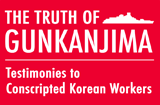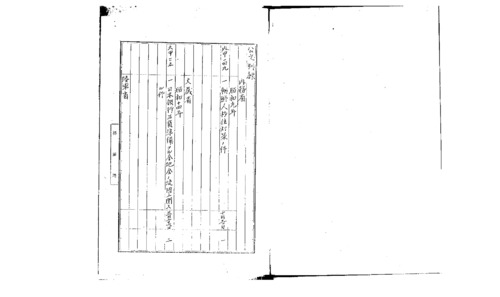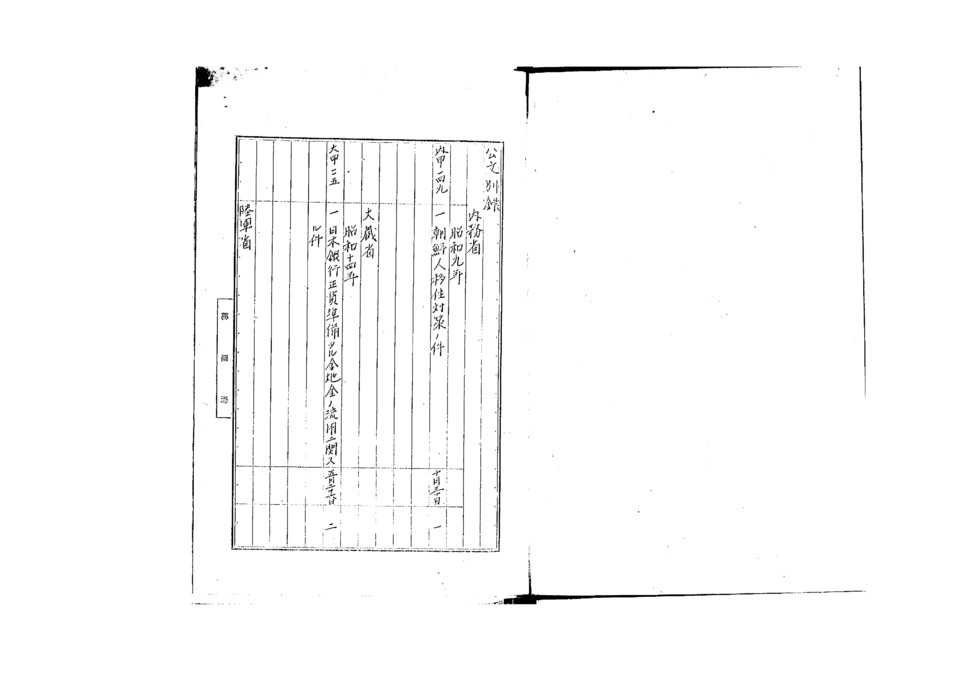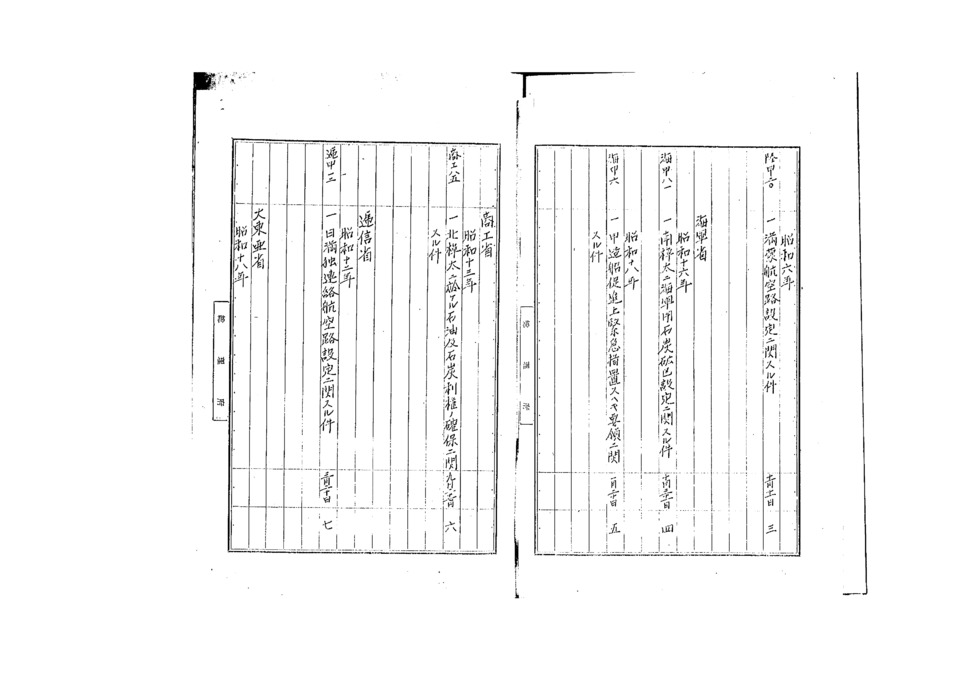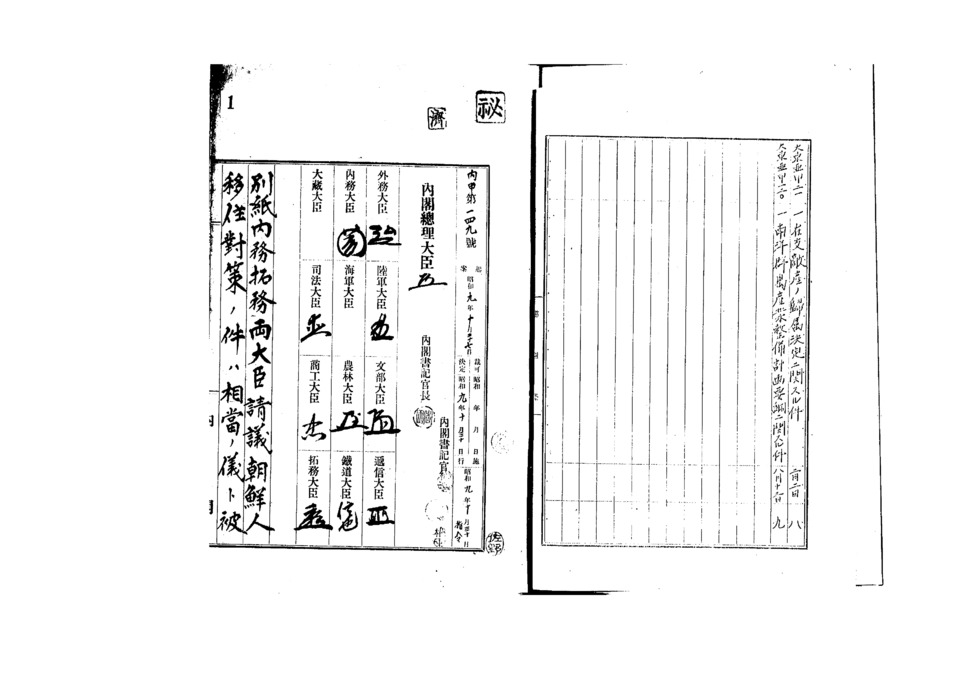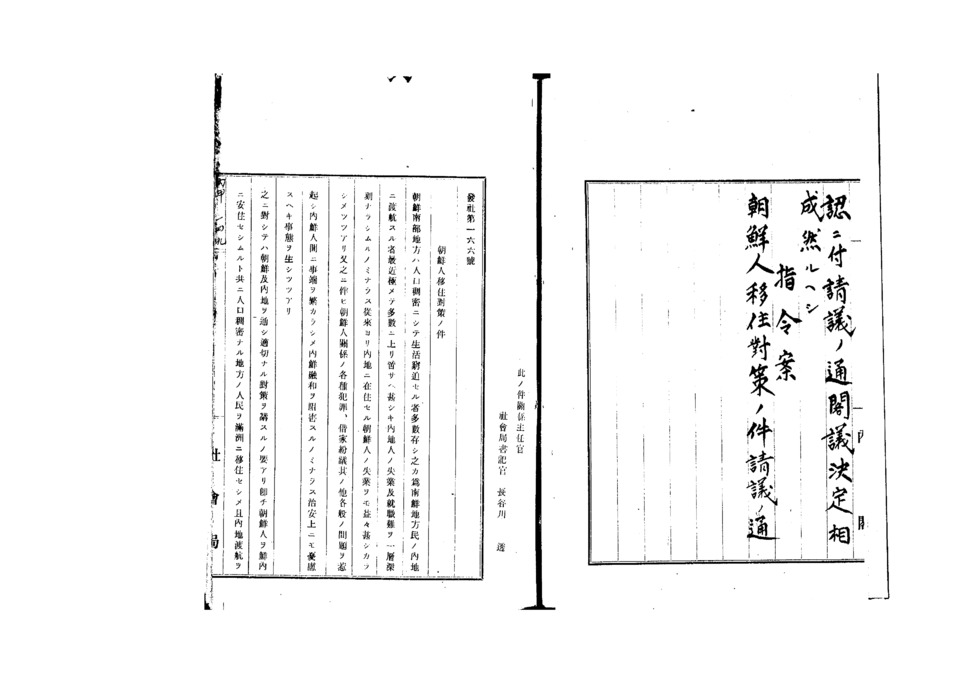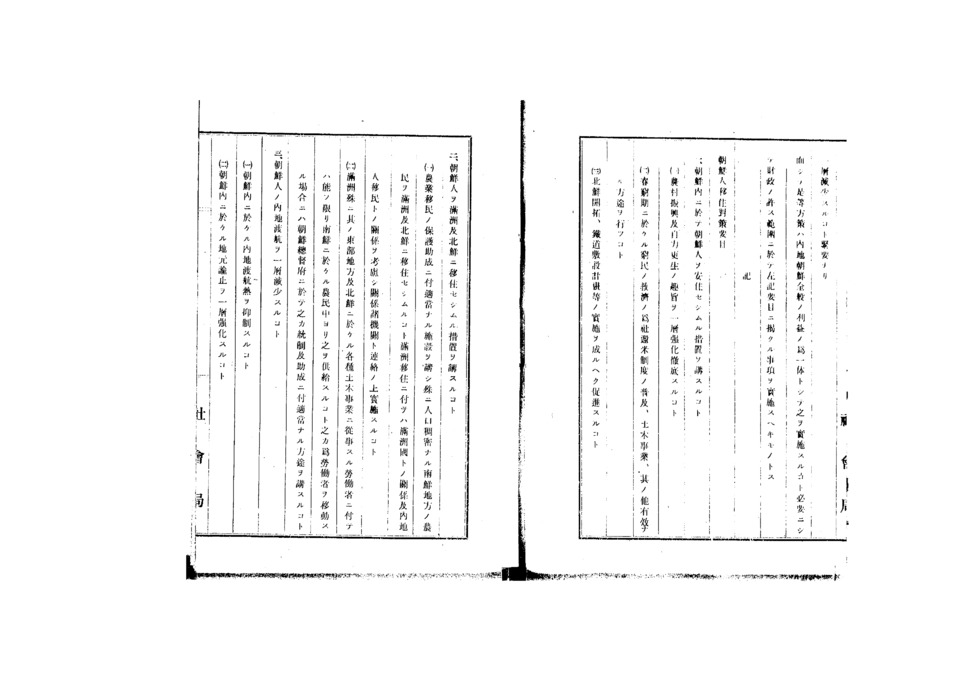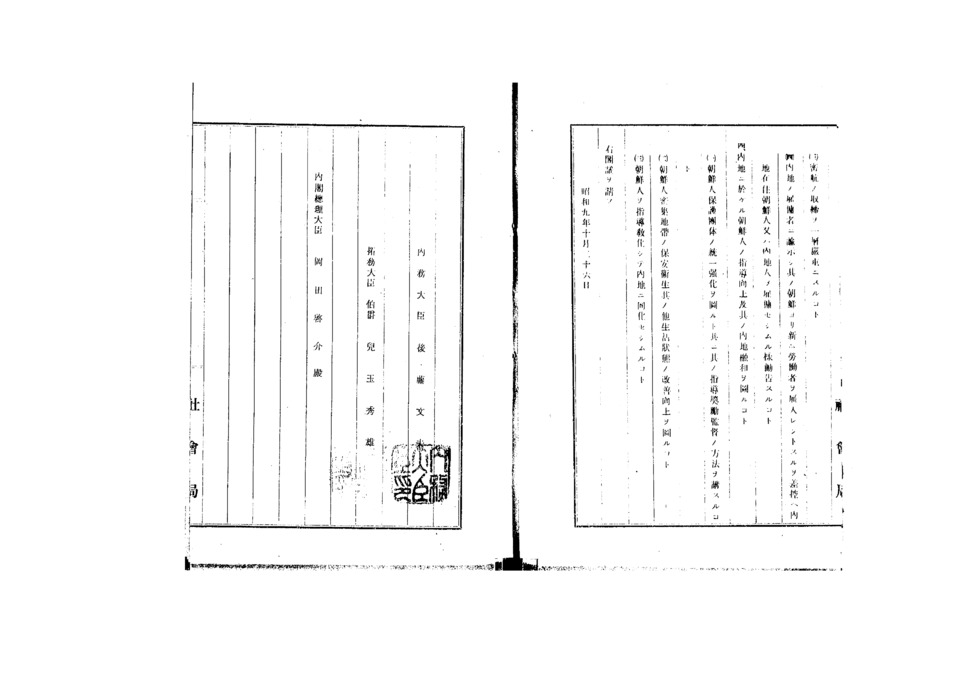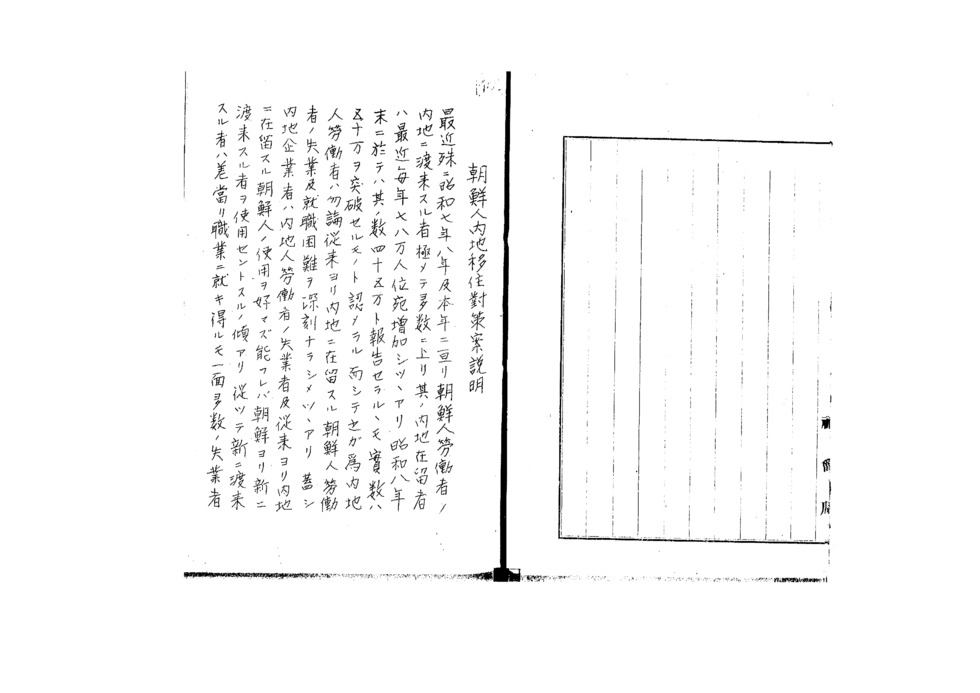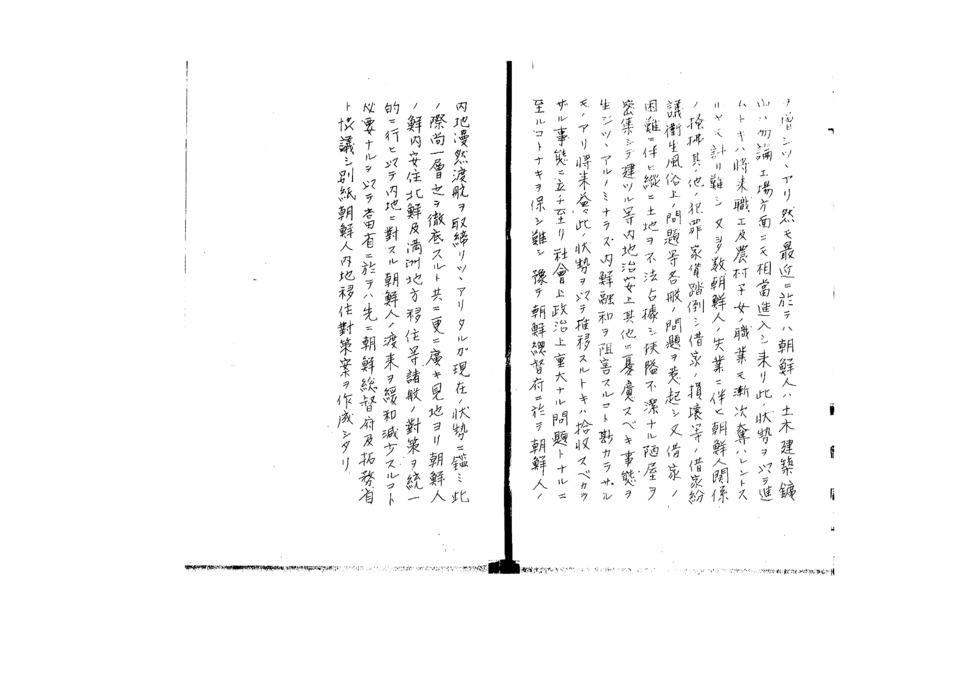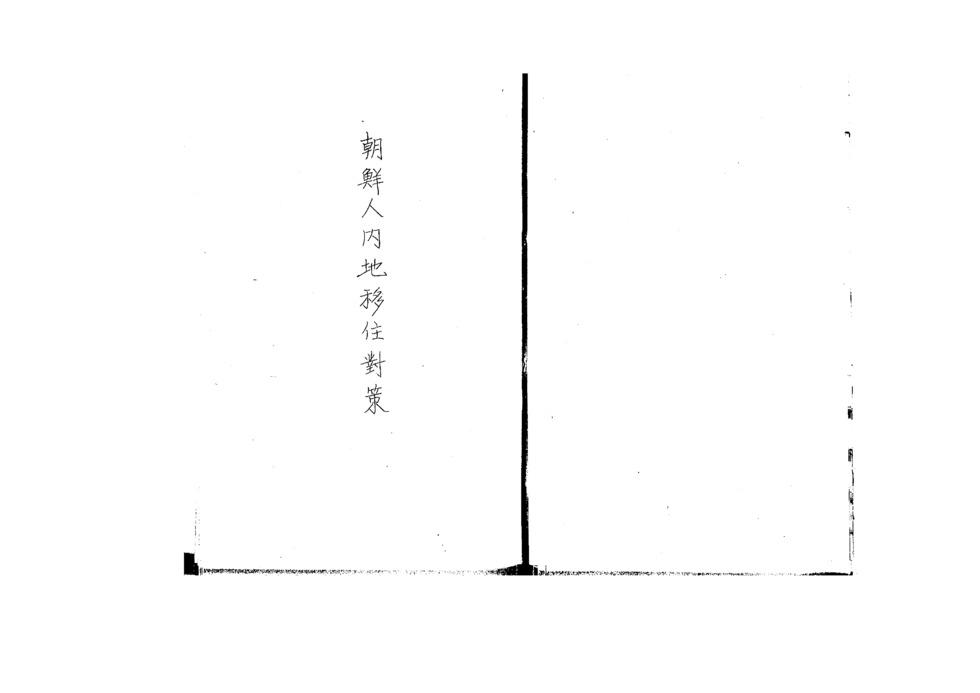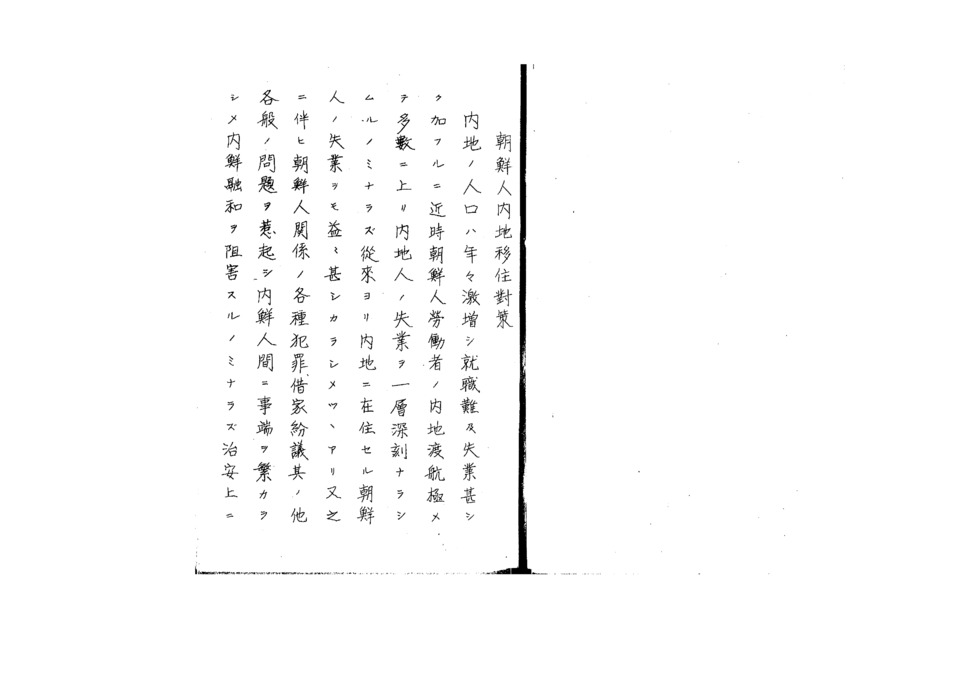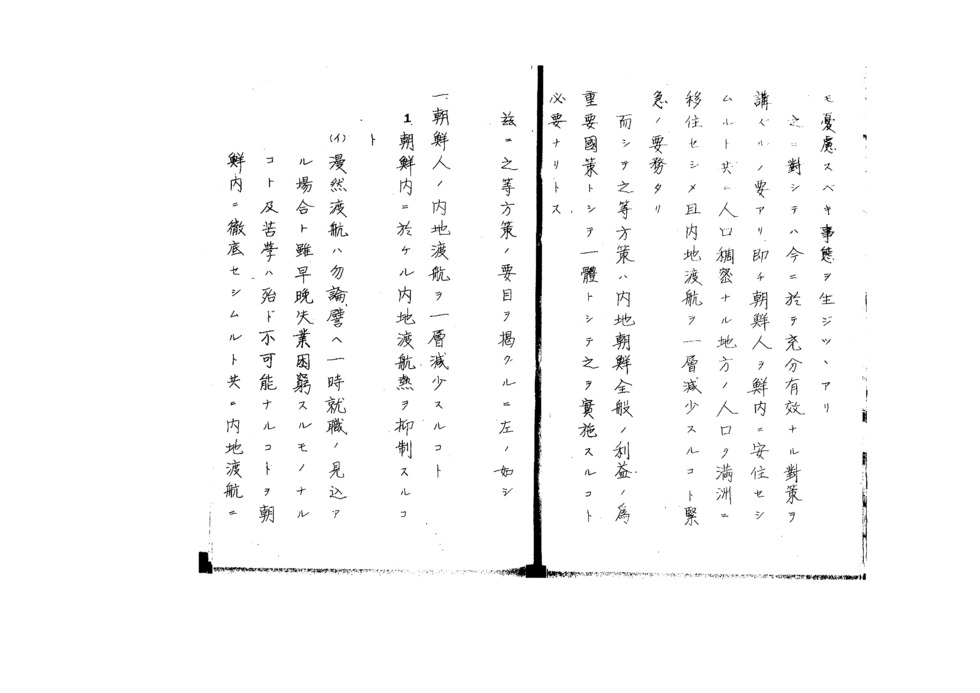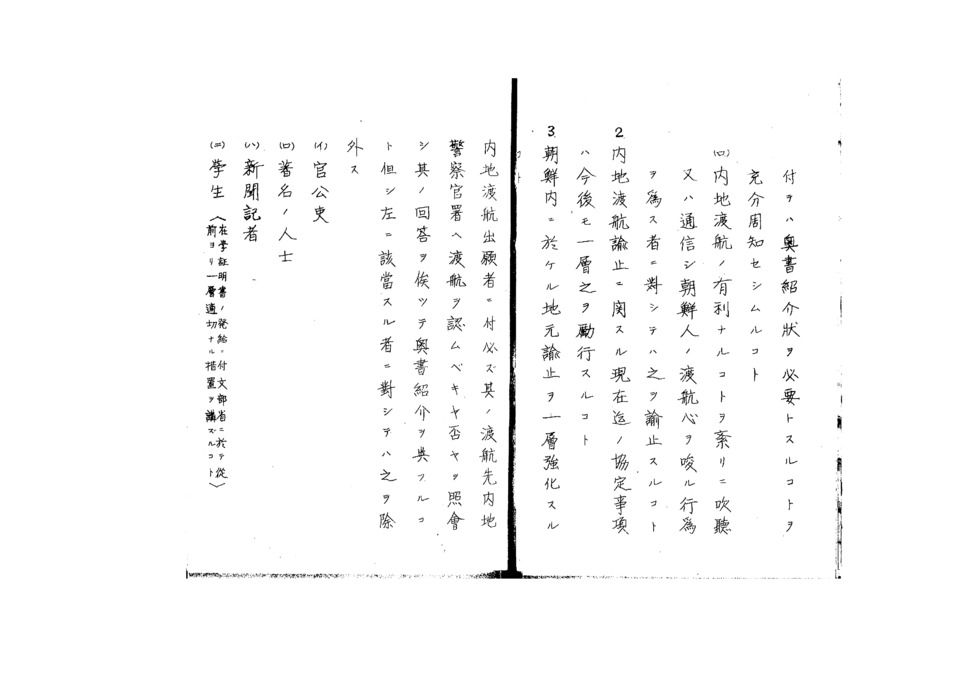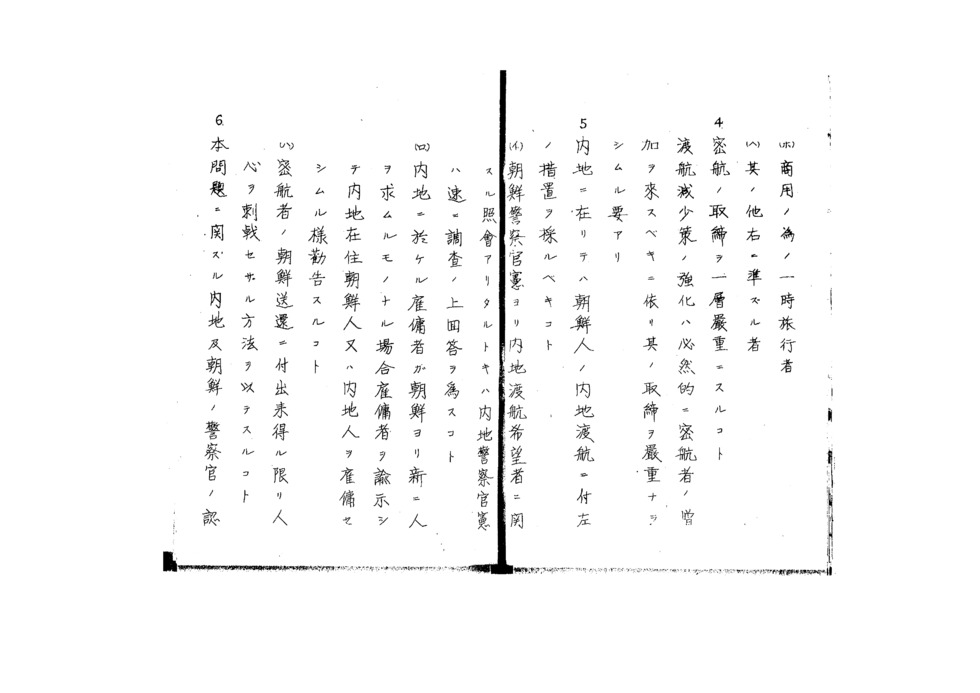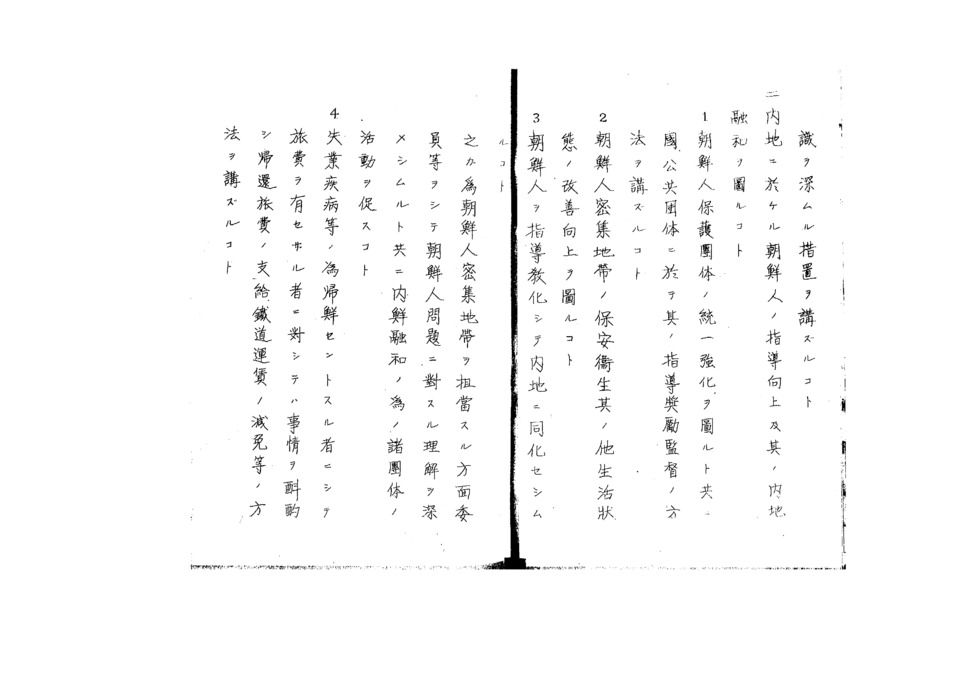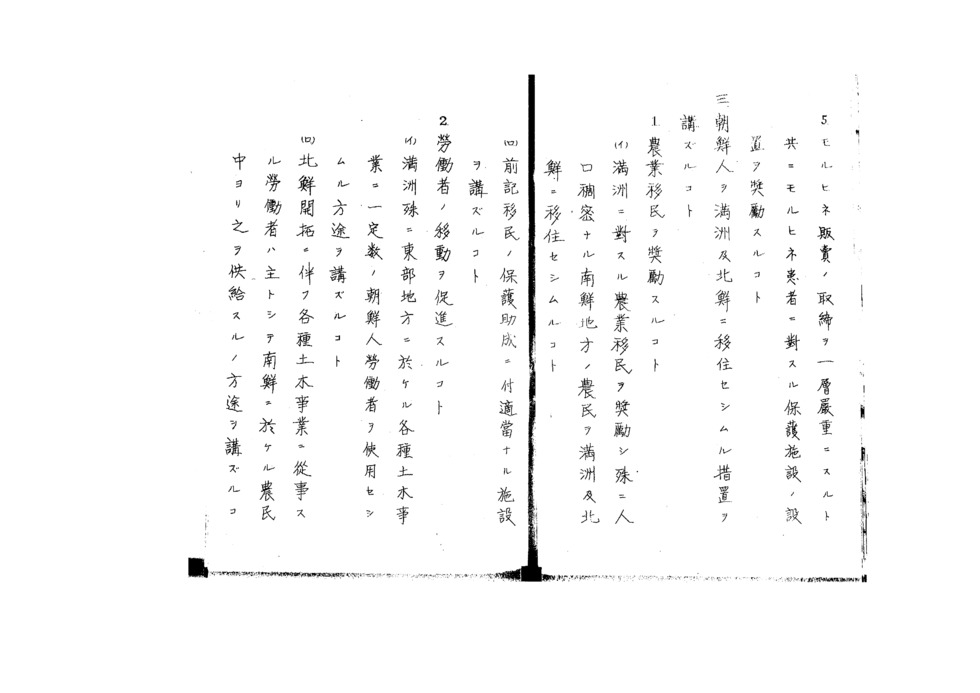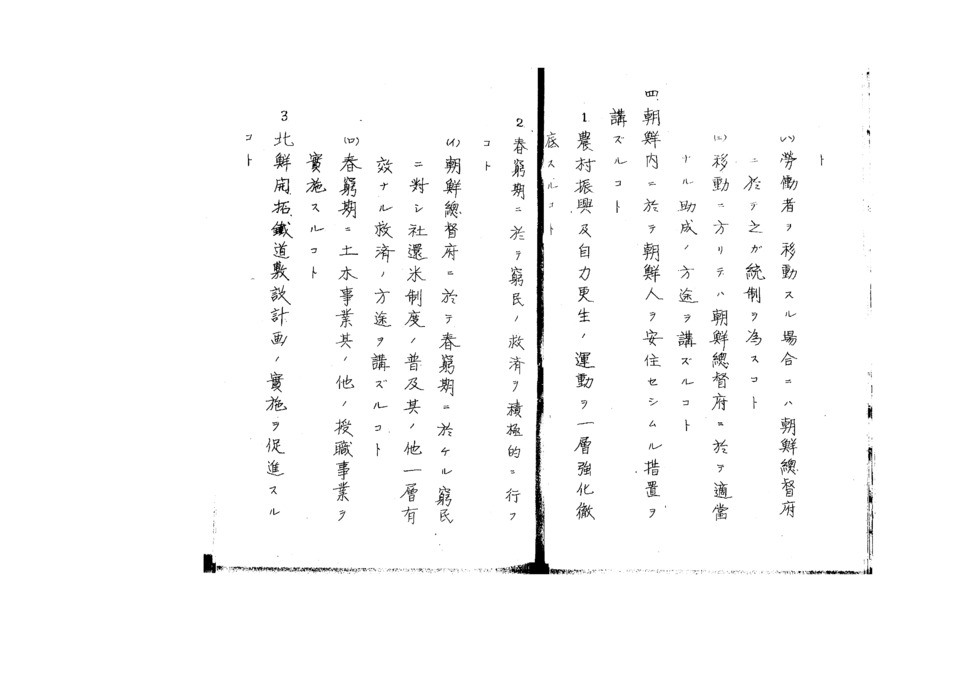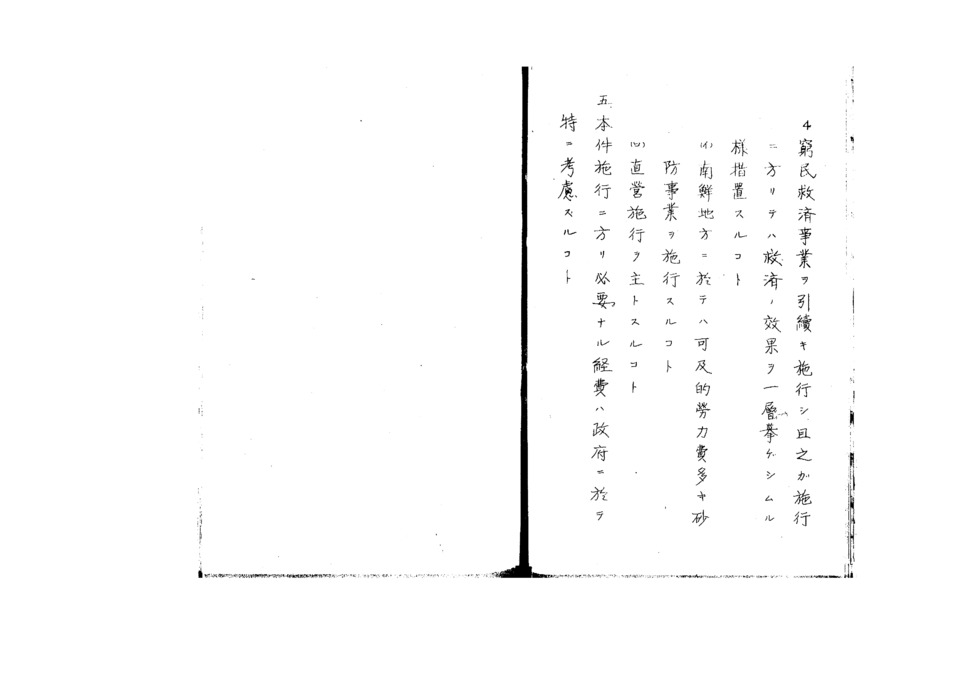Page 1
Page 2
Page 3
Page 4
Page 5
Page 6
Page 7
Page 8
Page 9
Page 10
Page 11
Page 12
Page 13
Page 14
Page 15
Page 16
Page 17
No.8
Since the matter of measures regarding Korean migration outlined in the attached petition by the Minister of Home Affairs and Minister of Colonial Affairs is recognized to be appropriate, a Cabinet resolution should be passed in accordance with the petition.
Draft Directive
Measures regarding Korean Migration as stated in petition
Social Affairs Bureau Directive No. 166
Measures regarding Korean Migration
Due to the dense population and straitened living conditions in southern Korea, the number of people migrating from southern Korea to the homeland has increased greatly in recent years. This has not only led to greater unemployment and difficulties in finding work for Japanese people, but has also resulted in increasing unemployment among Koreans already residing in the homeland. It has also been accompanied by various problems such as crimes and disputes over rent involving Koreans and trouble between Koreans and Japanese, which is not only undermining Japanese-Korean harmony, but also giving rise to concerns about public order.
With regard to this matter, appropriate measures are necessary in both Korea and the homeland. While ensuring that Koreans can live peaceably in Korea it is essential to promote the migration of people in densely populated areas to Manchuria and the reduction of immigrants to the homeland.
It is necessary to implement these measures in coordination for the overall benefit of both the homeland and Korea. Accordingly, the following matters should be implemented as far as finances permit.
Main Items of Measures regarding Korean Migration
- Take measures to ensure that Koreans can live peaceably in Korea.
- Further strengthen and thoroughly promote rural development and self-reliance.
- Promote the diffusion of the Shakanmai system (grain loan system), civil engineering projects and other effective measures to provide relief for the poor in the harsh spring season.
- Take measures for the migration of Koreans to Manchuria and northern Korea.
- Establish suitable facilities for protecting and assisting agricultural migrants and encourage migration to Manchuria and northern Korea of farmers in southern Korea, which is particularly densely populated. Regarding migration to Manchuria, these measures shall be implemented through coordination between related organizations, taking into account relationships with Manchuria and with immigrants from the homeland.
- Workers who are to take part in various civil engineering projects in Manchuria, particularly in its eastern region, and in northern Korea shall be recruited to the greatest extent possible from farmers in southern Korea. So when these workers migrate, the Office of the Governor-General of Korea shall determine appropriate means of control and support.
- Reduce the passage of Koreans to the homeland
- Restrain enthusiasm in Korea for passage to the homeland.
- Further strengthen dissuasive measures in Korea.
- Take stricter measures against stowaways.
- Instruct employers in the homeland to refrain from employing new workers from Korea and urge them to employ Koreans already living in the homeland or Japanese nationals.
- Improve guidance of Koreans in the homeland and promote their integration in the homeland
- Unify and strengthen organizations for protecting Koreans and establish means of guidance, encouragement and supervision.
- Promote safety and hygiene and other improvements in living conditions in areas with large populations of Koreans.
- Provide Koreans with guidance and education and assimilate them in the homeland.
We request that the above be discussed by the Cabinet.
Fumio Goto, Minister of Home Affairs
Count Hideo Kodama, Minister of Colonial Affairs
To Keisuke Okada, Prime Minister
October 26, 1934
Explanation of Draft Measures regarding Migration of Koreans to the Homeland
In recent years, particularly in 1932, 1933 and this year, a very large number of Korean workers have come to the homeland, and the number of them staying has been increasing by about 70,000 to 80,000 persons a year. It is reported that their total number at the end of 1933 was about 450,000, but the actual figure is believed to be over 500,000. As a result, unemployment and difficulty in finding work are becoming a serious problem not only for Japanese workers but also for Korean workers already residing in Japan. It appears that businesses in the homeland prefer not to hire unemployed Japanese workers or Koreans who are already residing in Japan, choosing if possible to employ new workers migrating from Korea. Therefore, even if workers newly arriving from Korea may be able to find work in the short term, this tendency is increasing the number of unemployed workers. Furthermore, in recent years, large numbers of Koreans have been engaging not only in civil engineering, construction and mining work, but also work at factories. If this situation continues, it is possible that factory workers and young people from rural areas in the homeland may gradually be deprived of work. Moreover, with the unemployment of many Korean workers, problems involving Koreans may occur such as pilfering or other crimes, disputes related to rented accommodation such as non-payment of rent or damaging rented houses, and problems concerning public health and morality. As a result of the difficulty in renting accommodation, persons may unlawfully occupy land as they like or build dense clusters of cramped and unclean shacks. This is not only giving rise to situations that should cause concern from the viewpoint of public order in the homeland, but may greatly impair harmony between Japan and Korea. If such circumstances increase in the future, this may lead to a situation that can no longer be controlled, and it may even be difficult to prevent it becoming a serious social and political issue. The Office of the Governor-General of Korea is currently bringing under control the aimless passage of Koreans to the homeland, but in view of the current situation, this needs to be implemented even more thoroughly. From a broader viewpoint, it is necessary to take various coordinated measures, such as measures to ensure that Koreans can live peaceably in Korea, and to promote migration of Koreans to northern Korea and Manchuria, thereby reducing the number of Koreans migrating to the homeland. Accordingly, the Home Affairs Ministry, through discussions with the Office of the Governor-General of Korea and the Ministry of Colonial Affairs, has drafted the attached Measures regarding Migration of Koreans to the Homeland.
Measures regarding Migration of Koreans to the Homeland
With the rapid growth in the population of the homeland every year, unemployment and difficulties in finding work have increased. In recent years, the number of Korean workers migrating to the homeland has greatly increased, leading not only to greater unemployment among Japanese people but also to greater unemployment among Koreans already residing in the homeland. It has also been accompanied by various problems such as crimes and disputes over rent involving Koreans and trouble between Koreans and Japanese, which is not only undermining harmony between Japan and Korea, but also giving rise to concerns about public order.
With regard to this matter, it is necessary to immediately take sufficiently effective measures. While ensuring that Koreans can live peaceably in Korea it is urgently required to promote the migration of people in densely populated areas to Manchuria and the reduction of immigrants to the homeland.
It is necessary to promote the coordinated implementation of these measures as important national policy for the overall benefit of both the homeland and Korea.
The main items of these measures are as stated below.
- Further reduce the passage of Koreans to the homeland
- Restrain enthusiasm in Korea for passage to the homeland
- Thoroughly inculcate in Korea the fact that not only aimless passage to the homeland but passage with some momentary expectations of employment will sooner or later lead to unemployment and destitution and that it is not possible to work one’s way through school, and to disseminate the fact that an introductory letter with certification is necessary for passage to the homeland.
- Admonish persons who engage in behavior that encourages Koreans to move to the homeland by carelessly spreading the word that passage to the homeland is beneficial.
- Enforce more strictly existing agreements regarding the restraint of passage to the homeland.
- Further strengthen dissuasive measures in Korea.
Regarding applicants for passage to the homeland, make a point of inquiring at the police station at their destination whether they should be permitted to undertake passage to the homeland and, according to the response, issue a letter of introduction with certification. However, the following persons shall be exempt from this.
- Public officials
- Gentlemen of distinction
- Journalists
- Students (taking more appropriate measures at the Ministry of Education regarding the issuing of a certificate of student status)
- Temporary travelers for commercial purposes
- Others to whom the above is applicable.
- Stricter control of stowaways
Since strengthening of measures to reduce passage will inevitably lead to an increase in stowaways, stricter control will be necessary.
- The following measures should be taken in Japan regarding Koreans’ passage to the homeland.
- When an inquiry is made by the Korean police authorities concerning a person who wishes to go to the homeland, a response shall be made promptly after investigation by the police authorities in the homeland.
- In the event that an employer in the homeland seeks new workers from Korea, the employer shall receive instruction and be urged to employ Koreans living in the homeland or Japanese workers.
- The return of stowaways to Korea shall be conducted as far as possible in ways that do not agitate public feeling.
- Measures shall be taken to deepen the awareness of this problem among police officers in the homeland and in Korea.
- Improve the guidance of Koreans in the homeland and promote harmony in the homeland
- Promote the integration of organizations for protecting Koreans and determine methods of guidance, encouragement and supervision in national public entities.
- Promote safety and health and other improvements in living conditions in areas with large populations of Koreans.
- Provide Koreans with guidance and education and assimilate them in the homeland.
To this end, get local staff, etc. responsible for areas with large populations of Koreans to deepen their understanding of Korean problems and promote the activities of various organizations for the sake of harmony between Korea and the homeland.
- Regarding persons who wish to return to Korea due to unemployment, illness, etc., but cannot afford to pay for the journey, take into account the situation and take measures such as providing the return fare or reducing or exempting the railway fare.
- Enforce stricter control of the sale of morphine and encourage the establishment of facilities for the protection of morphine addicts.
- Take measures for the migration of Koreans to Manchuria and northern Korea.
- Encourage agricultural migration
- Encourage agricultural migration to Manchuria and in particular, promote the migration of farmers in densely populated southern Korea to Manchuria and northern Korea.
- Establish appropriate facilities for protecting and assisting the above-mentioned migrants.
- Promote the movement of workers
- Determine the means for the employment of a certain number of Korean workers in various civil engineering projects in Manchuria, particularly eastern Manchuria.
- Together with the development of northern Korea, determine the means of recruiting workers, particularly farmers in southern Korea, to take part in various civil engineering projects.
- When moving workers, the Office of the Governor-General of Korea should control the movement.
- Determine means for the provision of appropriate assistance for movement by the Office of the Governor-General of Korea.
- Take measures to ensure that Koreans can live peaceably in Korea.
- Further strengthen and thoroughly promote rural development and self-reliance.
- Actively provide relief for the poor in the harsh spring season.
- The Office of the Governor-General of Korea should promote the diffusion of the Shakanmai system (grain loan system) and other effective measures to provide relief for the poor in the harsh spring season.
- Implement civil engineering and other projects for the purpose of providing jobs in the harsh spring season.
- Promote the implementation of a plan for building a railway for the development of northern Korea.
- Continue to provide relief for the poor and take measures to make relief even more effective.
- In southern Korea, implement an erosion control project with as high a labor cost as possible.
- Conduct the project mainly under direct management.
- The government shall take into special consideration the necessary expenses for the implementation of these measures.
Letter from Kiyoshi Ikeda, Director the Bureau of Police Affairs, Office of the Governor-General of Korea
Shichiro Niwa, Director of the Bureau of Social Affairs
March 20, 1934
Dear Mr. Niwa,
I hope this letter finds you well and good spirits.
I greatly appreciate the exceptional concern you have shown regarding the problem of Koreans in the homeland. As well as asking for your greater assistance regarding this problem, I wish to describe my frank impressions of the situation I found when I visited Tokyo and the observations of the staff of the Bureau of Police Affairs who inspected the prefectures of Osaka, Hyogo, Yamaguchi, and Fukuoka.
First of all, based on our direct observations of the living situations of Koreans in the homeland, it seems that the majority of the Koreans nowadays described as “unemployed” in Tokyo, Osaka and other places should be able to find work if they earnestly seek it. It appears that the characteristically idle lifestyle of Koreans has been extended to the homeland and that, under the influence of misgovernment under the former administration of Koreans, they have come to enjoy living in idleness and do not feel any hardship even in situations which should be considered more miserable than that of the Japanese. Generally speaking, since wages for work in the homeland are higher and it is easier to find work than in Korea, persons diligently engaging in labor enjoy a considerably richer living situation in the homeland. This is the greatest cause of the increase of migrants in spite of the fact that we are strictly regulating “aimless travelers” to the homeland. However, even though their living conditions are considerably better than in Korea, as described above, we must give further consideration to the fact that they are unpopular with the Japanese or are being subjected to criticism mainly due to problems related to rented accommodation and matters of public health and morality. Basically, Koreans have a tendency to become accustomed to favors and the amplification of this into self-indulgent behavior in many cases should be attributed to their ethnic character. I dare say that the above-mentioned problems spring from the fact that, having become newly-registered compatriots they are treated with considerable leniency by the government and people in the homeland and that they have become imbued with a “guest worker attitude.”
As you are aware, the rented accommodation problem has already become worse in Tokyo and Osaka. According to a survey by inspectors from the Police Affairs Bureau of landlords renting large numbers of houses to Koreans in Kobe and Shimonoseki, the situation in both locations has rapidly deteriorated and among them there are more than a few corrupt elements who have been persuading people not to pay rent, which is a cause of great concern. However, when we examine the actual situation of these Koreans, we find that while they usually share housing rented for five to six yen a month among two or three families, the rent paid by one family is equivalent to the wages they receive for one or two days’ work, so there is no reason whatsoever for failure to pay rent. Indeed, a considerable number of these non-payers of rent are actually sending five to ten yen every month to their hometowns in Korea. Accordingly it should be emphasized that the problem, as stated above, is the spread of bad customs that spring from defects of the ethnic character and the guest worker attitude. With regard to the problems related to public health and morality, this is also a case of unrefined country people getting used to lenient treatment and living according to the same customs and manners as in Korea after coming to the homeland, resulting in discord with the people around them and various criticism.
If I may be permitted to express my own opinion regarding countermeasures, as a solution to the rented accommodation problem I recommend stationing special police detectives in areas with large populations of Koreans and having them conduct regular investigations to determine incomes of non-payers of rent and the reasons for non-payment and to caution perpetrators of misconduct. Furthermore, in cases where corrupt elements intervene and engage in unlawful and wicked behavior, they should thoroughly expose and punish the perpetrators and make them realize that continuing not to pay rent will ultimately not be to their advantage. At the same time, for law-abiding persons, it will be necessary to take measures to alleviate housing difficulties to ensure that there is no misunderstanding that they are receiving discriminatory treatment because they are Koreans.
Regarding health and hygiene problems, I think it would be very effective to appoint special health officers at police stations and have them mainly conduct guidance and control and, to promote the guidance and education of resident Koreans, to appoint local staff with specialist knowledge of Koreans particularly in areas with large Korean populations to undertake the regulation and extension of facilities. Another problem that must be given serious thought is the control, etc. of morphine addicts. In determining measures to deal with these problems relating to Koreans, in view of their mobility and potential spread of the problems themselves, it is most important that all the prefectures as far as possible establish, in step with each other, policies to prevent the deterioration of these problems and the elimination of bad customs that have become widespread.
Needless to say, it will also be necessary to carry out tougher crackdowns in Korea on the aimless passage of Koreans to the homeland. The attached notification will be sent out to each province, urging them to undertake stricter control of persons aimlessly crossing to the homeland. In view of the fact that, under the present circumstances, the problem relating to Koreans residing in the homeland is worsening, lowering people’s trust in Koreans and damaging harmony between Korea and Japan, I earnestly request the consideration of Director of the Bureau of Social Affairs.
I look forward to receiving your opinion.
Sincerely yours,
Kiyoshi Ikeda,
Director,
Bureau of Police Affairs,
Office of the Governor-General of Korea
P.S. This matter will be notified to the Director of the Police Affairs Bureau of the Home Ministry
Korea Confidential Notification No. 101
March 5, 1934
Director, Bureau of Police Affairs,
Director, Bureau of Educational Affairs
To Governors of Provinces
Regulation of Koreans Crossing to the Homeland
While the passage of Koreans to the homeland, which is considered to be strictly enforced in accordance with the policy of the Office of the Governor-General of Korea, has continued to increase rapidly, the depression of the economy in the homeland shows no sign of recovery and demand in the labor market remains low. As a result, large numbers of persons are becoming unemployed in each region and many workers, who account for a large proportion of persons crossing from Korea, are falling into unemployment. In addition to being a pitiable state of affairs, the resulting distressed living conditions are fermenting various abuses. Among these, more than a few persons have turned to thieving, swindling and gambling. Exchange students end up having to work as a result of their financial situation. Moreover, in the current situation, since it is almost impossible to pay school fees by working, such persons naturally fall prey to left-wing movements and the like, and some of them are used by direct action groups. As a result, trust of Koreans residing in the homeland in general has been falling considerably, and recently the feelings of Japanese people toward Koreans have been greatly exacerbated to the extent that it might even lead to a situation where an incident could occur, like at the time of the Great Kanto Earthquake, which would be a matter of acute concern from the viewpoints of both harmony between Korea and Japan and the government of Korea. Although there are various countermeasures, considering that the further restriction of the passage of Koreans to the homeland is now considered to be a matter of great urgency, the authorities in the provinces should keep in close touch with each other and ensure that the public is thoroughly informed as to the living conditions of Korean workers and students residing in the homeland. At the same time, you should inform the public of the shortage of workers in northern Korea and the considerable demand for labor there and implement the stricter enforcement of control of so-called “stowaways” whose number will inevitably increase as a result of the restriction to the extent possible of aimless passage to the homeland. As you are already well aware, there is always opposition from Koreans to these controls, but in view of the recent appeals for the elimination of discrimination between Korea and Japan, when implementing these Regulations, please endeavor to ensure that people understand their aims and take care not to excite public feeling or arouse resentment.
P.S. Please note that while the phrase “prevention of passage” has been used up to now, since this may not be proper in view of the aims of these Regulations, they shall hereafter be administered based on the phrase “dissuasion of passage”.
